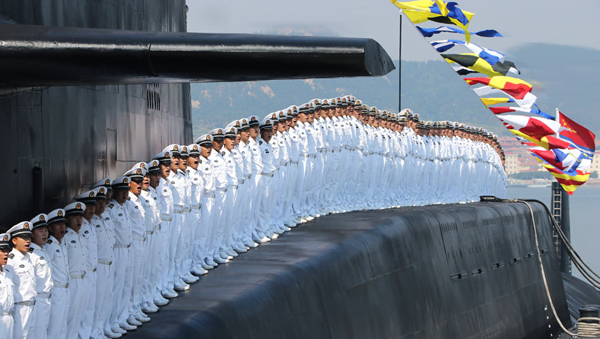Nuclear submarine fleet comes of age
 0 Comment(s)
0 Comment(s) Print
Print E-mail China Daily, October 28, 2013
E-mail China Daily, October 28, 2013
|
Sailors stand at attention on the nuclear submarine, stationed at the Qingdao base.[China Daily] |
China's nuclear submarine fleet has had a remarkable safety record for more than 40 years and gained rich experience through rigorous training and drills, its fleet commanders said.
"We are China's first nuclear submarine force, and the 42 years since our establishment have witnessed our success in avoiding nuclear accidents," Rear Admiral Gao Feng, commander of one of the People's Liberation Army navy's submarine bases, told reporters during a rare open house in Qingdao.
This is a tremendous achievement because almost all of the other naval powers in the world, including the United States and Russia, have had nuclear accidents on nuclear submarines, Gao said.
Senior Captain Jin Xupu, deputy chief of staff of the base, said nuclear reactors at nuclear submarines are much more sophisticated than those used in nuclear power stations and require higher safety standards.
"A nuclear submarine is like a moving nuclear power station, and its reactors must be capable of resisting stormy waves."
Jin said crewmembers on nuclear submarines must be able to respond quickly and promptly to any kind of contingency, such as a steam leak or fire.
"It's very difficult to handle a fire during combat because the situation is different than when the submarine stays on the surface or it is peacetime, so crewmembers must pass numerous training tests and exercises on emergency response."
When stationed in the base, captains and their crewmembers must check equipment on the boat on a weekly basis so that hazards can be discovered and fixed before the submarine leaves the base, said Peng Weihua, head of equipment supervision at the Qingdao base.
Ever since it was founded, the elite unit has been maintaining a low profile. Military observers and analysts have had few opportunities to look inside the deterrence force.
The official debut of the fleet was in 2009, when the PLA navy celebrated the 60th anniversary of its founding with a spectacular parade that included warships from China and 14 other nations.
Two nuclear submarines of the Chinese navy led the parade and attracted much attention from the international media and the public, with many foreign military observers speculating that China's nuclear submarine force had become strong and confident enough to show its muscle.
However, the force had chosen to continue a low profile until a recent open house for Chinese journalists.
"After more than 40 years of development, now is the time for us to show the world our determination and ability to safeguard peace and tell our people about this ‘mysterious' force," said Rear Admiral Li Yanming, political commissar of the Qingdao base.
With China's advancements in technological and manufacturing capabilities together with the increasing investment in arsenal modernization, the nuclear submarine fleet has made huge strides in its long-distance patrol trainings, senior officers said.
"I think the claims of some on the Internet that we are backward and can't defeat other nations' navies are biased," Gao said. "Although our boats are not as advanced as our rivals', we have the ‘spirit of victory', and our tactics are good enough to enable us to compete with them."
Moreover, the training and drills are designed for and simulate actual combat, leading to submariners being well prepared for any situation, he said.
"In addition, we have gained a lot of experience through confrontation with our rivals, and such occasions testify to our prowess and confidence."
Gao's remarks were endorsed by retired commanders.
Qu Weiping, former political commissar at the base, said: "A nuclear submarine is a symbol of a powerful nation and a guardian of national security. We are the only maritime strategic force in Asia and an important part of the navy's emergency-response combat forces."
Qu said he has received several foreign military delegations that have visited Chinese nuclear submarines, and they all spoke highly of the crewmembers' performance. Although he is unable to compare the skills and abilities of foreign submarines' crewmembers with his own submariners, "I am convinced our men are able to rival any of their foreign counterparts".
He said the world record for longest voyage of submarine, 90 days, was set by one of his boats, and the distance it traveled is one and a half times the length of the equator.
Wang Ping, a retired officer at the base who had been political commissar on a nuclear submarine, said he had taken part in receiving a visiting delegation of French naval officers.
"Back then, our vessel and equipment were backward compared with theirs, but they were impressed by the good condition of our equipment and my officers' excellent ability to operate and maintain them," he said.
Officers said their dreams have become realities as more advanced submarines and weapons are delivered to them.
"When I first joined the nuclear submarine force, becoming a captain was my dream," said Senior Captain Yang Su, deputy commander of the base.
"And now, what I dream is to navigate our most advanced, modern nuclear submarine to sail around the world to promote peace and friendship."







Go to Forum >>0 Comment(s)